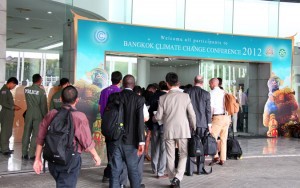This article was published on Climate Action Network Int’l Voice Blog
Bangkok CC Conference (photo: ENB, IISD)
It has been nearly three years since I started following the climate change negotiations. I first attended the UN Climate Change Conference (UNFCCC) intersessional meeting in Barcelona organized just before Fifteenth Conference of Parties (COP15), a well-known Copenhagen climate summit. After that, I got selected as a Southern Capacity Building Fellow of CAN International for two years (2010 and 2011). Southern Capacity Building Program is more about strengthening capacity of civil society members from developing countries on climate change negotiation. I attended every COP and intersessions during 2010 and 2011 as a fellow.
After having some experience at the grassroots level and this short engagement in the UNFCCC process, I find it very challenging to link the expectations of communities with the progress of ongoing negotiations. Last week, after attending the Bangkok intersession, I faced a similar situation- having to update the communities within my country about the current state of negotiation. The Bangkok intersession was about exchanging of ideas on key issues to build on Durban decisions and finding ways to bring one of the Ad-hoc working groups to conclusion. This is not easy to convey to the grassroots people, who were waiting for action, not discussion.
Furthermore, the Bangkok session focused on how to raise ambition and strengthen international cooperation while finding ways to frame the Ad-hoc Working Group on Durban Platform (ADP) to deal with what will be implemented by 2020. Similarly, Ad-hoc Working Group-Kyoto Protocol (AWG-KP) and Ad-hoc Working Group – Long Term Action (LCA) were focused on fulfilling specific mandates from COP 17 and to resolve outstanding issues to ensure the successful completion of the group’s work in COP18. In reality, this makes little sense to the communities.
Unless such discussions and decisions at the international level do not adequately address the expectation of vulnerable communities at grassroots level, people will attach less importance to such meetings. The time has come for negotiators to take decisions to save the Earth and not only to sustain their national economy in the short run. By lengthening the process, we are only contributing towards the problem and not the solution. The ultimate goal of such international conventions and the development of a treaty is to make this Earth livable for every living being. But, one way or another, we are stuck with petty discussions and negotiating in pieces – this is very problematic.
This is not to say that nothing happened in the Bangkok meeting: some progress was made. The AWG-KP produced an informal paper outlining the elements for a Doha decision and increased clarity on options to address the transition to the second commitment period. Similarly, the work of the AWG-LCA was captured in an informal overview note of the AWG-LCA Chair to help clarify areas of convergence.
But again, how can I share these updates to the people back in my country who are waiting for some concrete decisions for action? How should I explain to the farmers that we are advocating for actions at the global level, after having been told their agriculture yield will be impacted by climate change? Also, how could I convince the Sherpa in the Himalayas, who have recently replaced flat stone roofs with slope roofs, because nowadays they’ve started getting rain instead of snow? These are only a few examples, but again: how can I convince them that we have pushed the global deal for 2015 -that will be only implemented by 2020? Must they just adapt with what they have? It seems so, because we have no progress on reducing emissions, building on financial need or building the institutions on adaptation, technology or finance.


